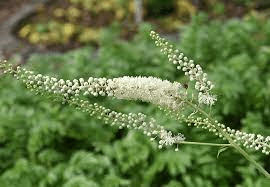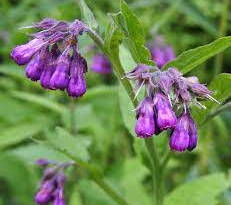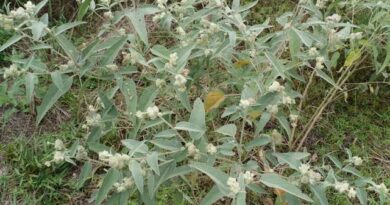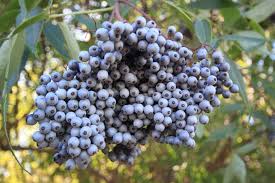20 Medicinal Health Benefits Of Black Cohosh (Actaea racemosa)
Black Cohosh (Actaea racemosa), also known as Black Snakeroot or Cimicifuga racemosa, is a perennial herbaceous plant native to North America. This herb belongs to the Ranunculaceae family and has a long history of traditional use by Native American populations for various medicinal purposes.
Morphologically, Black Cohosh features tall, erect stems with compound leaves that have toothed leaflets. In late spring to early summer, the plant produces elongated spikes of small, white flowers. The fragrant flowers are arranged in a raceme, giving the plant its species name “racemosa.”
The rhizomes (underground stems) of Black Cohosh are the parts of the plant traditionally used for medicinal purposes. Black Cohosh contains several bioactive compounds, including triterpene glycosides, flavonoids, and phenolic acids, which are believed to contribute to its potential therapeutic effects.
Black Cohosh has been primarily used in traditional herbal medicine to address various women’s health issues. It is particularly renowned for its use in alleviating symptoms associated with menopause, such as hot flashes, night sweats, and mood disturbances.
The plant is thought to have estrogenic effects, although the exact mechanism is not fully understood.
While Black Cohosh has gained popularity as a natural remedy for menopausal symptoms, it’s important to note that scientific research on its efficacy has yielded mixed results. Some studies suggest a potential benefit, while others do not show significant effects.
Culturally, Black Cohosh has been respected by Native American traditions, where it was used for a variety of purposes, including supporting women’s health and as a general tonic. The plant’s use has persisted into contemporary herbalism, and it is available in various forms, such as capsules, tinctures, and teas.
It’s crucial to approach the use of Black Cohosh with caution and under the guidance of healthcare professionals, as its safety and efficacy can vary among individuals. Pregnant or breastfeeding individuals and those with certain medical conditions should avoid its use or use it only under the supervision of a qualified healthcare provider.
The Botanical Description of Black Cohosh
1. Appearance: Black Cohosh (Actaea racemosa) is a perennial herbaceous plant known for its tall, slender stems and distinctive feathery white flowers. The plant can reach heights of six feet and stands out with its striking, elongated flower clusters.
2. Leaves: The leaves of Black Cohosh are large and compound, divided into multiple leaflets with toothed edges. The foliage contributes to the overall lush appearance of the plant and provides a backdrop to its tall floral spikes.
3. Flowers: The flowers of Black Cohosh bloom in late spring to early summer, forming elongated, candle-like spikes. Each individual flower is small and white, creating a visually appealing contrast against the dark green foliage.
4. Root System: Below the ground, Black Cohosh develops a thick and knotty rhizome system. The roots are dark and fibrous, extending horizontally and contributing to the plant’s stability in various soil types.
5. Habitat: Native to eastern North America, Black Cohosh thrives in rich, moist woodlands and shaded areas. It is often found in the understory of deciduous forests, where it benefits from dappled sunlight.
6. Growing Conditions: This herbaceous plant prefers cool, shaded environments with well-drained soil. It is well-adapted to the conditions of its native woodlands, where it often grows alongside other woodland species.
7. Foliage Changes: As autumn approaches, the leaves of Black Cohosh undergo a transformation, turning shades of yellow and bronze. This seasonal change adds to the plant’s visual appeal in natural settings.
8. Pollinator Attraction: Black Cohosh is known to attract pollinators, including bees and butterflies, with its fragrant flowers. The ecological role of the plant extends beyond its medicinal uses, contributing to local biodiversity.
9. Reproduction: The plant reproduces both by seed and by the spread of its rhizome system. This combination of seed dispersal and rhizome growth contributes to the naturalization of Black Cohosh in suitable habitats.
The Geographic Distribution of Black Cohosh
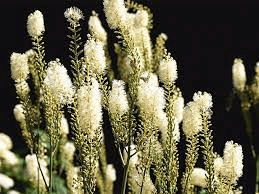
1. Eastern North America: Black Cohosh is primarily distributed in the eastern part of North America, ranging from the central and eastern United States to parts of Canada. It is particularly prevalent in the Appalachian region.
2. Woodlands and Shaded Areas: The plant thrives in woodlands, especially those with moist and shaded conditions. It is commonly found in the understory of deciduous forests, where it benefits from filtered sunlight.
3. Appalachian Mountains: Black Cohosh is abundant in the Appalachian Mountains, where the cool and mountainous terrain provides an ideal habitat for its growth.
4. Central and Southern States: The distribution of Black Cohosh extends to central and southern states, including regions with a temperate climate and suitable woodland ecosystems.
5. Canada: In Canada, Black Cohosh can be found in provinces such as Ontario, Quebec, and parts of the Maritimes, contributing to its broad geographic range.
6. Forested Regions: The plant’s preference for forested regions, coupled with its adaptability to various soil types, allows it to thrive in diverse ecosystems within its geographic range.
7. Mid-Atlantic States: Black Cohosh is present in the mid-Atlantic states, adding to the plant’s regional diversity in terms of climate and habitat.
8. Biotic Relationships: The plant’s distribution is influenced by its interactions with other species, including trees and understory plants, forming a complex ecological web within its native range.
The Chemical Composition of Black Cohosh
1. Triterpene Glycosides: Black Cohosh contains triterpene glycosides, including actein and cimicifugoside, which are believed to contribute to its medicinal properties, particularly in addressing female reproductive health.
2. Phenolic Compounds: Phenolic compounds such as ferulic acid and isoferulic acid are present in Black Cohosh, contributing to its antioxidant properties and potential health benefits.
3. Flavonoids: Flavonoids, including quercetin and kaempferol, are found in Black Cohosh and are known for their antioxidant and anti-inflammatory effects.
4. Alkaloids: Small amounts of alkaloids, such as N-methylcytisine, have been identified in Black Cohosh. Alkaloids can have various physiological effects in plants and may contribute to the plant’s overall chemical composition.
5. Tannins: Tannins, with their astringent properties, are present in Black Cohosh and may play a role in its traditional uses, including potential benefits for skin health.
6. Essential Oils: While in smaller quantities, Black Cohosh contains essential oils that contribute to its distinct fragrance. The presence of essential oils adds to the overall chemical diversity of the plant.
7. Resins: Resins, with potential protective functions, are part of the chemical composition of Black Cohosh. These may play a role in the plant’s defense mechanisms.
8. Isoflavones: Black Cohosh contains isoflavones, including formononetin and biochanin A, which are phytoestrogens and may influence hormonal balance in the body.
9. Caffeic Acid Derivatives: Compounds such as caffeic acid derivatives are present in Black Cohosh and contribute to its overall bioactivity, potentially influencing various physiological processes.
10. Cytokinin-like Compounds: Black Cohosh has been found to contain cytokinin-like compounds, which are known for their role in plant growth and development.
11. Polysaccharides: Polysaccharides, including arabinogalactans, have been identified in Black Cohosh. These complex carbohydrates may have immunomodulatory effects.
12. Trace Elements: The plant’s chemical composition includes trace elements, such as selenium and zinc, which contribute to its nutritional profile and potential health benefits.
Read Also: 19 Medicinal Health Benefits Of Damiana (Turnera diffusa)
The Medicinal Health Benefits Of Black Cohosh (Actaea racemosa)
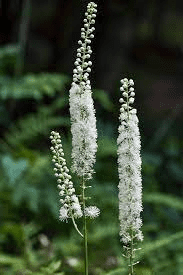
1. Menopausal Symptom Relief: Black Cohosh has gained popularity for its potential to alleviate menopausal symptoms, including hot flashes, night sweats, and mood swings.
2. Hormonal Balance: The phytoestrogens in Black Cohosh, specifically the isoflavones, may contribute to hormonal balance in women, making it a natural option for addressing hormonal fluctuations.
3. Menstrual Cycle Regulation: Some studies suggest that Black Cohosh may help regulate the menstrual cycle, providing relief from irregularities and discomfort.
4. Anxiety and Mood Support: Black Cohosh has been associated with potential mood-stabilizing effects, offering support for women experiencing mood swings and anxiety during hormonal changes.
5. Osteoporosis Prevention: The plant’s influence on hormonal balance may contribute to bone health, potentially aiding in the prevention of osteoporosis in postmenopausal women.
6. Anti-Inflammatory Effects: Black Cohosh contains compounds with anti-inflammatory properties, which may offer relief from conditions associated with inflammation.
7. Muscle Relaxation: Traditionally used for muscle relaxation, Black Cohosh may help ease muscle tension and discomfort.
8. Headache Relief: Some individuals find relief from headaches and migraines through the use of Black Cohosh, possibly due to its muscle-relaxing effects.
9. Cardiovascular Health: Preliminary studies suggest that Black Cohosh may have cardiovascular benefits, including potential effects on blood pressure and cholesterol levels.
10. Immune System Support: Compounds like polysaccharides in Black Cohosh may contribute to immune system support, enhancing the body’s natural defenses.
11. Anti-Anxiety Effects: Beyond hormonal support, Black Cohosh has been explored for its potential anti-anxiety effects, offering a holistic approach to mental well-being.
12. Anti-Cancer Properties: Some research suggests that Black Cohosh may possess anti-cancer properties, particularly in relation to breast cancer cells. However, further studies are needed to confirm these effects.
13. Cognitive Function: The plant has been studied for its potential impact on cognitive function, with indications that it may support brain health and memory.
14. Antioxidant Protection: The presence of phenolic compounds and flavonoids in Black Cohosh contributes to its antioxidant properties, helping to protect cells from oxidative stress.
15. Anti-Rheumatic Effects: Traditional uses include the management of rheumatic conditions, with Black Cohosh potentially offering anti-rheumatic effects.
16. Sleep Aid: Black Cohosh has been associated with improved sleep quality, providing relief from insomnia and sleep disturbances.
17. Skin Health: Tannins and antioxidant compounds in Black Cohosh may contribute to skin health, offering benefits for conditions such as acne and inflammation.
18. Gastrointestinal Support: The plant’s anti-inflammatory and muscle-relaxing effects may extend to gastrointestinal support, potentially alleviating digestive discomfort.
19. Urinary Tract Health: Black Cohosh has been explored for its potential benefits on urinary tract health, including relief from symptoms such as urinary incontinence.
20. Anti-Aging Effects: The combination of antioxidant compounds in Black Cohosh may contribute to anti-aging effects, promoting overall skin health and vitality.
The Methods of Usage to Achieve the Provided Health Benefits Of Black Cohosh (Actaea racemosa)
1. Herbal Infusions: Prepare herbal infusions by steeping dried Black Cohosh roots or leaves in hot water. This method allows for the extraction of beneficial compounds.
2. Tinctures: Tinctures made from Black Cohosh provide a concentrated form of the plant’s medicinal properties. Tinctures can be added to water or taken sublingually for quick absorption.
3. Capsules and Tablets: Black Cohosh supplements, available in capsule or tablet form, offer a convenient and standardized way to incorporate the herb into a daily wellness routine.
4. Topical Creams: Some individuals may benefit from topical creams or ointments containing Black Cohosh, particularly for conditions such as muscle tension or skin-related issues.
5. Teas: Black Cohosh tea, made from the dried roots or leaves, is a traditional method of consumption. The warm beverage is not only soothing but also allows for the ingestion of beneficial compounds.
6. Poultices: Create poultices by applying mashed Black Cohosh roots or leaves directly to the skin. This method is commonly used for localized relief, such as muscle tension.
7. Extracts: Liquid extracts of Black Cohosh provide a concentrated form of the plant’s active compounds. These extracts can be added to beverages or taken directly.
8. Dietary Supplement Formulations: Black Cohosh is often included in formulations of dietary supplements designed to address specific health concerns, offering a comprehensive approach.
9. Culinary Uses: While not a common culinary herb, Black Cohosh can be incorporated into certain recipes, such as herbal broths or teas, for those who prefer a culinary approach to herbal consumption.
10. Aromatherapy: Harness the aromatic properties of Black Cohosh through aromatherapy, using essential oils derived from the plant to promote relaxation and stress relief.
The Side Effects Of Using Black Cohosh Medicinal Plant
1. Gastrointestinal Discomfort: Some individuals may experience gastrointestinal discomfort, including nausea or digestive disturbances, when using Black Cohosh. This is often dose-dependent.
2. Headache and Dizziness: In rare cases, the use of Black Cohosh has been associated with headaches and dizziness. Monitoring for these side effects is advisable.
3. Allergic Reactions: Individuals with known allergies to plants in the Ranunculaceae family, to which Black Cohosh belongs, should exercise caution to avoid potential allergic reactions.
4. Interactions with Medications: Black Cohosh may interact with certain medications, especially those affecting hormonal regulation. Consultation with a healthcare professional is essential.
5. Liver Health Concerns: While the link between Black Cohosh and liver health is debated, individuals with pre-existing liver conditions should exercise caution and seek medical advice.
6. Breastfeeding and Pregnancy: Pregnant and breastfeeding individuals should avoid using Black Cohosh without consulting a healthcare professional, as its impact on pregnancy is not well-established.
7. Hormonal Effects: Due to its potential influence on hormonal balance, individuals with hormone-sensitive conditions, such as breast cancer, should consult with healthcare professionals before use.
8. Not for Prolonged Use: Long-term use of Black Cohosh is not recommended without supervision. Periodic breaks from usage may be advised to assess ongoing health effects.
9. Blood Pressure Changes: Some individuals may experience changes in blood pressure when using Black Cohosh. Regular monitoring is advisable, especially for those with hypertension.
10. Skin Sensitivity: Topical applications of Black Cohosh may cause skin sensitivity or irritation in some individuals. Performing a patch test is recommended.
11. Respiratory Symptoms: Rarely, individuals may experience respiratory symptoms, such as shortness of breath, when using Black Cohosh. Discontinuation and medical attention are necessary if such symptoms occur.
12. Impact on Fertility: While research is inconclusive, individuals trying to conceive should exercise caution, and consultation with a healthcare professional is advisable.
13. Potential Weight Gain: Some individuals have reported weight gain as a side effect of Black Cohosh use. Monitoring weight changes is recommended.
Read Also: How to Grow, Use and Care for Tuckerman’s Sedge Grass (Carex tuckermanii)
The Scientific Research and Studies of Black Cohosh
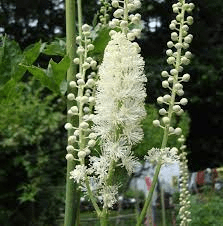
1. Menopausal Symptom Relief: Numerous studies have explored the effectiveness of Black Cohosh in relieving menopausal symptoms, with some suggesting positive outcomes in reducing hot flashes and night sweats.
2. Hormonal Influence: Research has delved into the plant’s potential hormonal influence, particularly its impact on estrogen receptors, shedding light on its use in addressing hormonal imbalances.
3. Cognitive Function: Studies have investigated the impact of Black Cohosh on cognitive function, with some suggesting potential cognitive benefits, particularly in postmenopausal women.
4. Bone Health: The plant’s potential role in supporting bone health has been explored, with indications that it may contribute to the prevention of osteoporosis in menopausal women.
5. Anti-Inflammatory Effects: Scientific research supports the anti-inflammatory effects of Black Cohosh, providing a basis for its traditional use in addressing inflammatory conditions.
6. Muscle Relaxation: The muscle-relaxing properties of Black Cohosh have been studied, offering insights into its potential benefits for conditions involving muscle tension.
7. Cardiovascular Effects: Preliminary studies suggest that Black Cohosh may have cardiovascular effects, including potential impacts on blood pressure and cholesterol levels. Further research is needed to confirm these findings.
8. Anti-Anxiety Properties: Scientific investigations have explored the potential anti-anxiety properties of Black Cohosh, indicating its role in supporting mental well-being during hormonal changes.
9. Antioxidant Activity: Research has identified the antioxidant activity of Black Cohosh, attributing its health benefits to the presence of phenolic compounds and flavonoids that protect cells from oxidative stress.
10. Immunomodulatory Effects: Studies suggest that Black Cohosh may have immunomodulatory effects, potentially influencing the immune system and supporting overall health.
11. Anti-Cancer Potential: Some studies have explored the anti-cancer potential of Black Cohosh, particularly in relation to breast cancer cells. However, more extensive research is required to establish its efficacy.
The Safety Precautions and Recommendations In Using Black Cohosh Medicinal Plant
1. Consultation with Healthcare Professional: Before incorporating Black Cohosh into your health regimen, consult with a healthcare professional, especially if you have pre-existing medical conditions or are taking medications.
2. Allergy Testing: Perform a patch test before using Black Cohosh topically to assess for any allergic reactions or skin sensitivity.
3. Moderation in Consumption: Use Black Cohosh in moderation, as excessive consumption may lead to adverse effects such as gastrointestinal discomfort.
4. Sun Protection: If using Black Cohosh topically, be mindful of increased photosensitivity. Use sun protection measures to prevent skin damage.
5. Pregnancy and Breastfeeding: Pregnant and breastfeeding individuals should exercise caution and seek professional advice before using Black Cohosh due to limited safety data.
6. Monitoring Blood Pressure: Individuals with hypertension should monitor blood pressure levels when using Black Cohosh, as it may influence blood pressure.
7. Discontinue in Case of Adverse Reactions: If any adverse reactions occur, such as skin irritation, gastrointestinal discomfort, or respiratory issues, discontinue use and seek medical attention if needed.
8. Educate Yourself: Stay informed about the proper methods of preparation and usage of Black Cohosh to maximize benefits and minimize risks.
9. Keep Out of Reach of Children: Store Black Cohosh products safely, out of reach of children, to prevent accidental ingestion or misuse.
10. Integration with Traditional Medicine: If using Black Cohosh alongside traditional medicines, inform your healthcare provider to avoid potential interactions.
11. Responsible Wildcrafting: If harvesting Black Cohosh from the wild, practice responsible wildcrafting by ensuring sustainability and respecting natural habitats.
12. Not a Substitute for Professional Advice: While Black Cohosh may offer potential health benefits, it is not a substitute for professional medical advice or treatment.
FAQs About Black Cohosh Medicinal Plant
1. Is Black Cohosh Safe for Long-Term Use?
While short-term use is generally considered safe for most individuals, long-term use of Black Cohosh may require supervision. Regular health check-ups are advisable.
2. Can Black Cohosh Be Used During Pregnancy?
Pregnant individuals should avoid using Black Cohosh without consulting a healthcare professional due to potential effects on hormonal balance.
3. Does Black Cohosh Interact with Hormonal Medications?
Black Cohosh may interact with hormonal medications, and consultation with a healthcare provider is essential for those taking such medications.
4. Can Black Cohosh Cause Weight Gain?
Some individuals have reported weight gain as a side effect of Black Cohosh. Monitoring weight changes and adjusting dosage may be necessary.
5. How Long Does It Take to See Results from Using Black Cohosh?
The time it takes to see results can vary depending on the health condition being addressed. Consistent and appropriate use over time may be necessary.
6. Are There Any Known Cases of Black Cohosh Poisoning?
While rare, excessive consumption or misuse of Black Cohosh may lead to adverse effects. Following recommended dosages and usage guidelines can help prevent poisoning.
7. Does Black Cohosh Affect Hormone Levels?
Black Cohosh contains phytoestrogens that may influence hormone levels, particularly in women. Monitoring for hormonal changes is advisable.
8. Can Black Cohosh Be Used for Mental Health Conditions?
While some studies suggest potential mood-enhancing effects, individuals with mental health conditions should seek professional advice before relying on Black Cohosh as a sole treatment.
9. Is Black Cohosh Regulated as a Medicinal Plant?
Regulations regarding the use of Black Cohosh can vary. It is essential to be aware of local regulations and ensure responsible harvesting or cultivation practices.
10. How Does Black Cohosh Contribute to Wildlife Preservation?
Black Cohosh’s role in attracting pollinators, such as bees and butterflies, supports local ecosystems by promoting biodiversity and aiding in pollination.
11. Can Black Cohosh Be Used for Pet Health?
Using Black Cohosh for pets should be approached with caution. Consult with a veterinarian before introducing any herbal remedies to ensure the safety of your pets.
12. Does Black Cohosh Have Seasonal Variations in Potency?
The potency of Black Cohosh may vary seasonally due to factors such as weather conditions, soil quality, and plant growth stages. Harvesting at the optimal time may enhance medicinal properties.
13. Are There Any Traditional Rituals or Ceremonies Involving Black Cohosh?
In some indigenous cultures, Black Cohosh may have played a role in traditional rituals or ceremonies. Understanding cultural practices and respecting their significance is crucial.
14. Can Black Cohosh Be Used for Culinary Purposes?
While not a common culinary herb, the petals of Black Cohosh can be used as an edible garnish in salads or for decorative purposes in culinary creations.
15. What Are the Traditional Uses of Black Cohosh in Indigenous Cultures?
Black Cohosh has historical significance in various indigenous cultures, where it has been used for medicinal purposes. The specific traditional uses can vary among different communities.
16. Are There Any Known Cases of Black Cohosh Poisoning?
While rare, excessive consumption or misuse of Black Cohosh may lead to adverse effects. Following recommended dosages and usage guidelines can help prevent poisoning.
17. Can Black Cohosh Be Used for Mental Health Conditions?
While some studies suggest potential mood-enhancing effects, individuals with mental health conditions should seek professional advice before relying on Black Cohosh as a sole treatment.
18. Does Black Cohosh Interact with Other Herbal Remedies?
Interactions between Black Cohosh and other herbal remedies are possible. Consultation with a healthcare professional is recommended, especially when combining multiple herbal supplements.
Read Also: All You Need to Know About Black Panther Animal

